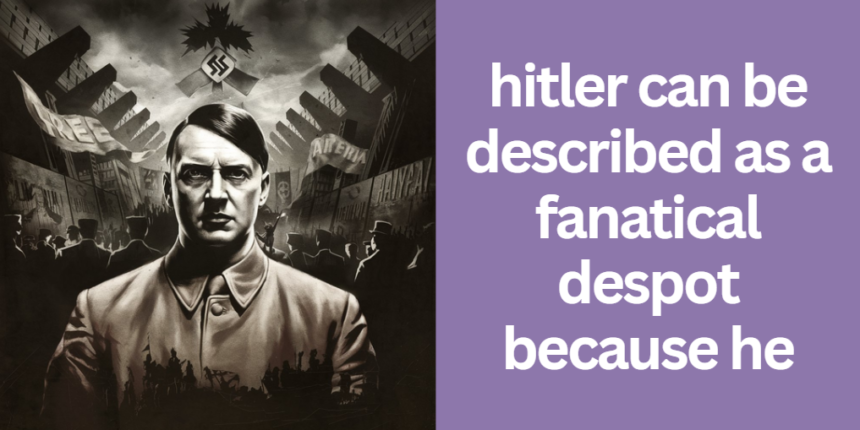In this article, we explore the historical and ideological factors behind the assertion that hitler can be described as a fanatical despot because he embraced extreme views and centralized absolute power.
By examining his background, rise to power, and the methods he employed, readers will gain a deep understanding of how his fanaticism translated into one of history’s most oppressive regimes. This comprehensive analysis not only provides historical context but also draws lessons for modern societies in recognizing the dangers of unchecked authority.
Historical Background
Post-World War I Germany
After the conclusion of World War I, Germany was left in a state of profound disarray. The political landscape was destabilized by economic hardship and widespread public discontent. The country was reeling from the social and economic impacts of defeat, setting the stage for dramatic changes in its governance.
The Treaty of Versailles and Economic Hardships
The harsh terms imposed by the Treaty of Versailles contributed significantly to the national crisis. Reparation payments and territorial losses fueled economic instability, creating fertile ground for radical ideologies to take root. These circumstances provided a context in which extremist views could gain traction among a population desperate for change.
Rise of National Socialism
Amid this turmoil, nationalist sentiments and a longing for restored national pride led to the emergence of the National Socialist movement. As political parties scrambled for influence, extremist factions, led by charismatic figures, managed to capture the disillusioned public’s imagination. This period marked the genesis of a movement that would eventually dominate German politics.
The Ascension of Hitler
Early Life and Influences
Adolf Hitler’s formative years were marked by personal hardships and exposure to radical nationalist ideas. His early experiences and encounters with anti-Semitic and nationalist propaganda significantly shaped his worldview, laying the foundation for his later actions as a leader.
Formation of the Nazi Party
Hitler’s political journey saw the formation of the Nazi Party, an organization that promised to restore German pride and address the nation’s woes. The party’s initial goals were rooted in reestablishing national unity, but they quickly morphed into a platform for extremist ideologies. As the party grew, it increasingly embraced radical solutions and xenophobic policies.
Political Strategies and Propaganda Tactics
A master of political strategy, Hitler exploited the vulnerabilities of the post-war society through a sophisticated use of propaganda. His messages resonated deeply with a population seeking certainty and direction. By utilizing modern media techniques and orchestrated public rallies, he built a powerful narrative that justified his consolidation of power.
Ideological Underpinnings of Fanatical Despotism
Obsessive Racial Purity
Central to Hitler’s ideology was an obsession with racial purity. His virulent anti-Semitism and belief in the superiority of the so-called Aryan race became the cornerstone of Nazi policies. These ideas were not merely theoretical; they translated into aggressive measures aimed at excluding and ultimately eradicating those deemed inferior.
Key Aspects:
- Anti-Semitism: Deep-seated hatred of Jews was institutionalized in laws and policies.
- Ethnic Hierarchies: The belief in a natural order among races underpinned discriminatory practices.
Extreme Nationalism and Expansionism
Hitler’s vision extended beyond racial purity. His aggressive nationalism and desire for territorial expansion were instrumental in shaping his policies. By advocating for the unification of all German-speaking peoples, he aimed to create a vast empire that justified his actions on the international stage.
Cult of Personality
The image of Hitler was meticulously crafted to foster a cult of personality. His public persona was amplified through relentless propaganda and media manipulation. By positioning himself as the ultimate authority, he ensured that dissent was not only discouraged but systematically eradicated.
Media Manipulation and Propaganda:
- The use of mass rallies, controlled press, and cinematic productions helped to solidify his mythic status.
- His carefully constructed image was essential in establishing the narrative of infallibility around his leadership.
Mechanisms of Totalitarian Control
Consolidation of Power
Hitler’s rise to absolute power was marked by a series of calculated moves. A pivotal moment was the Reichstag Fire, which paved the way for the Enabling Act—effectively suspending civil liberties and allowing the Nazi regime to operate without checks. The following table summarizes key events in this consolidation process:
| Event | Impact |
|---|---|
| Reichstag Fire | Provided justification for severe crackdowns on dissent. |
| Enabling Act | Legally sanctioned the centralization of power in the executive. |
| Elimination of Opposition | Systematic removal of political rivals and suppression of criticism. |
Suppression of Dissent
To maintain control, Hitler’s regime employed ruthless tactics to silence opposition. This suppression was achieved through a combination of censorship, intimidation, and legal persecution. Political adversaries were often removed from public life, and many were imprisoned or executed, ensuring that any challenge to Nazi authority was swiftly dealt with.
Terror and Repression
A hallmark of totalitarian control under Hitler was the institutionalized terror enforced by organizations like the Gestapo. The use of secret police and the establishment of concentration camps underscored the regime’s commitment to crushing resistance. This pervasive climate of fear served as a powerful tool to maintain control over a terrified populace.
Impact on German Society and the World
Domestic Repercussions
Within Germany, the impact of Hitler’s policies was both profound and far-reaching. Social structures were upended as old institutions were dismantled and replaced with state-controlled entities. Cultural life, education, and economic practices were reoriented to serve the interests of the Nazi ideology, leaving an indelible mark on the nation’s history.
The Outbreak of World War II
The aggressive expansionist policies of Hitler were a major catalyst for the outbreak of World War II. His unyielding ambition to extend German territory destabilized the European balance of power and ultimately led to a global conflict that reshaped the world order.
The Holocaust and Atrocities
Perhaps the most horrific aspect of Hitler’s legacy was the Holocaust—a systematic campaign of genocide aimed at exterminating Jews, Romani people, and other minority groups. The atrocities committed during this period remain a grim reminder of the destructive potential of extremist ideologies.
Comparative Analysis: Hitler’s Despotism in Historical Context
Comparison with Other Totalitarian Regimes
When comparing Hitler’s regime with other historical examples of totalitarian rule, several distinctive features emerge. Unlike some leaders who relied on ideological ambiguity, Hitler’s extreme views were openly and aggressively pursued. This unwavering commitment to his vision sets his despotism apart from other forms of authoritarian rule.
Lessons Learned
Examining the rise and fall of Hitler’s regime offers valuable lessons for contemporary societies. The warning signs of radicalization, the dangers of concentrated power, and the role of propaganda in shaping public opinion are all critical areas of study. Understanding these elements can help prevent the recurrence of similar tyrannical systems in the future.
Legacy and Modern Relevance
Enduring Impact on Global Politics
The consequences of Hitler’s actions continue to influence global political discourse. His regime serves as a cautionary tale of how extremist ideologies and the unchecked pursuit of power can lead to catastrophic outcomes. This historical precedent is frequently referenced in discussions about modern authoritarianism.
Historical Memory and Remembrance
Efforts to preserve the memory of the atrocities committed under Nazi rule have played a crucial role in shaping historical consciousness. Museums, memorials, and educational programs ensure that the lessons of the past remain visible and that future generations understand the perils of fanatic despotism.
Contemporary Implications
The narrative that hitler can be described as a fanatical despot because he centralized power, embraced extreme ideologies, and used terror to suppress dissent resonates in modern analyses of political extremism. The parallels drawn between historical totalitarian regimes and current political movements highlight the ongoing relevance of these historical lessons.
Frequently Asked Questions
1. How did the international community initially respond to Hitler’s rise to power?
While many world leaders were cautious and uncertain about Hitler’s ambitions, early international reactions were mixed. Some governments, driven by the desire to avoid another devastating conflict, chose appeasement and diplomatic engagement.
In contrast, others grew increasingly alarmed as reports of aggressive territorial ambitions emerged. This delicate balance between caution and concern set the stage for further global developments, and scholars continue to debate whether earlier, more decisive action could have altered the course of history.
2. In what ways has Hitler’s leadership influenced modern political discourse?
Hitler’s regime has become a critical reference point in contemporary discussions about authoritarianism and the concentration of power. Today, political analysts and commentators frequently invoke his leadership as a stark reminder of the dangers inherent in unchecked authority.
This influence extends to debates on civil liberties, the role of propaganda, and the importance of safeguarding democratic institutions. Modern political rhetoric often contrasts these historical lessons with current governance practices, reinforcing the need for transparency and accountability in leadership.
3. How have the lessons learned from Hitler’s rule shaped contemporary human rights practices?
The global horror at the atrocities committed during Hitler’s reign spurred an international movement to establish robust human rights protections. The aftermath of World War II saw the creation of legal frameworks, such as the Universal Declaration of Human Rights, designed to prevent state-sponsored discrimination and oppression.
These measures underscore the commitment of the global community to ensure that the brutal practices of the past are not repeated, influencing policies and conventions that protect individual freedoms and promote social justice today.
4. What role did economic conditions play in facilitating Hitler’s political ascent?
Economic turmoil was a key factor that contributed to the environment in which Hitler could rise to power. The severe instability following World War I, characterized by widespread unemployment and inflation, eroded confidence in traditional political institutions.
This economic discontent created an opening for radical alternatives, as many citizens sought swift and drastic solutions to their hardships. While the article touches on post-war economic challenges, this perspective emphasizes how financial distress directly fueled public desperation and allowed extremist narratives to take root.
5. How do modern historians evaluate the complexity of Hitler’s personality beyond his political actions?
Contemporary historians and psychologists examine Hitler’s character as a multifaceted phenomenon that went far beyond his notorious political actions. Beyond his strategic use of propaganda and consolidation of power, researchers explore factors such as his early life experiences, personal insecurities, and psychological makeup.
This analysis reveals a complex interplay of charisma, obsession, and paranoia that not only influenced his public policies but also his private decision-making processes. Such evaluations help explain why his leadership style has remained a subject of intense academic interest and debate.
Conclusion
In summary, this article has explored how hitler can be described as a fanatical despot because he not only pursued an extremist ideology but also implemented a regime characterized by ruthless suppression, totalitarian control, and profound societal impact.
By examining his rise to power, the ideological foundations of his rule, and the mechanisms of control he employed, we gain valuable insights into the destructive nature of fanatical despotism. This comprehensive review serves as both a historical account and a timeless warning against the dangers of unchecked authority.
Other Posts
Ultimate Guide to Altiris ITMS Update 8.7.2 Update: Features, Installation, and Best Practices
Alison Cactus Bikini Fashion Show: A Comprehensive Guide to Desert-Chic Fashion
Jamie Salviano Santa Barbara Wine: A Comprehensive Guide to Innovation and Terroir





